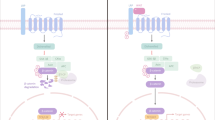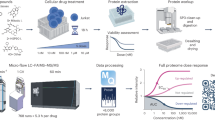Abstract
Valproate (VPA) and trichostatin A (TSA), inhibitors of zinc-dependent deacetylase activity, induce reduction in the levels of mRNA encoding oestrogen receptor-α (ERα), resulting in subsequent clearance of ERα protein from breast and ovarian cell lines. Inhibition of oestrogen signalling may account for the endocrine disorders, menstrual abnormalities, osteoporosis and weight gain that occur in a proportion of women treated with VPA for epilepsy or for bipolar mood disorder. Transcriptome profiling revealed that VPA and TSA also modulate the expression of, among others, key regulatory components of the cell cycle. Meta-analysis of genes directly responsive to oestrogen indicates that VPA and TSA have a generally antioestrogenic profile in ERα positive cells. Concomitant treatment with cycloheximide prevented most of these changes in gene expression, including downregulation of ERα mRNA, indicating that a limited number of genes signal a hyperacetylated state within cells. Three members of the NAD-dependent deacetylases, the sirtuins, are upregulated by VPA and by TSA and sirtuin activity contributes to loss of ERα expression. However, prolonged inhibition of the sirtuins by sirtinol also induces loss of ERα from cells. Mechanistically, we show that VPA invokes reversible promoter shutoff of the ERα, pS2 and cyclin D1 promoters, by inducing recruitment of methyl cytosine binding protein 2 (MeCP2) with concomitant exclusion of the maintenance methylase DNMT1. Furthermore, we demonstrate that, in the presence of VPA, local DNA methylation, deacetylation and demethylation of activated histones and recruitment of inhibitory complexes occurs on the pS2 promoter.
This is a preview of subscription content, access via your institution
Access options
Subscribe to this journal
Receive 50 print issues and online access
$259.00 per year
only $5.18 per issue
Buy this article
- Purchase on Springer Link
- Instant access to full article PDF
Prices may be subject to local taxes which are calculated during checkout







Similar content being viewed by others
References
Alao JP, Lam EW, Ali S, Buluwela L, Bordogna W, Lockey P, Varshochi R, Stavropoulou AV, Coombes RC and Vigushin DM . (2004). Clin. Cancer Res., 10, 8094–8104.
Anon (1998). Lancet, 351, 1451–1467.
Anon (2002). Lancet, 360, 817–824.
Bannister AJ and Miska EA . (2000). Cell Mol. Life Sci., 57, 1184–1192.
Bird A . (2002). Genes Dev., 16, 6–21.
Brzozowski AM, Pike AC, Dauter Z, Hubbard RE, Bonn T, Engstrom O, Ohman L, Greene GL, Gustafsson JA and Carlquist M . (1997). Nature, 389, 753–758.
Cariou S, Donovan JC, Flanagan WM, Milic A, Bhattacharya N and Slingerland JM . (2000). Proc. Natl. Acad. Sci. USA, 97, 9042–9046.
Carroll JS, Prall OW, Musgrove EA and Sutherland RL . (2000). J. Biol. Chem., 275, 38221–38229.
Davis T, Kennedy C, Chiew YE, Clarke CL and deFazio A . (2000). Clin. Cancer Res., 6, 4334–4342.
Denger S, Reid G, Kos M, Flouriot G, Parsch D, Brand H, Korach KS, Sonntag-Buck V and Gannon F . (2001). Mol. Endocrinol., 15, 2064–2077.
Denizot F and Lang R . (1986). J. Immunol. Methods, 89, 271–277.
Duncan S . (2001). Epilepsia, 42 (Suppl 3), 60–65.
Finlin BS, Gau CL, Murphy GA, Shao H, Kimel T, Seitz RS, Chiu YF, Botstein D, Brown PO, Der CJ, Tamanoi F, Andres DA and Perou CM . (2001). J. Biol. Chem., 276, 42259–42267.
Fuks F, Hurd PJ, Wolf D, Nan X, Bird AP and Kouzarides T . (2003). J. Biol. Chem., 278, 4035–4040.
Gottlicher M, Minucci S, Zhu P, Kramer OH, Schimpf A, Giavara S, Sleeman JP, Lo Coco F, Nervi C, Pelicci PG and Heinzel T . (2001). EMBO J., 20, 6969–6978.
Green PS and Simpkins JW . (2000). Ann. NY Acad. Sci., 924, 93–98.
Grozinger CM, Chao ED, Blackwell HE, Moazed D and Schreiber SL . (2001). J. Biol. Chem., 276, 38837–38843.
Isojarvi JI, Laatikainen TJ, Pakarinen AJ, Juntunen KT and Myllyla VV . (1993). N. Engl. J. Med., 329, 1383–1388.
Kim MS, Blake M, Baek JH, Kohlhagen G, Pommier Y and Carrier F . (2003). Cancer Res., 63, 7291–7300.
Klinge CM . (2001). Nucleic Acids Res., 29, 2905–2919.
Kramer OH, Zhu P, Ostendorff HP, Golebiewski M, Tiefenbach J, Peters MA, Brill B, Groner B, Bach I, Heinzel T and Gottlicher M . (2003). EMBO J., 22, 3411–3420.
Kurebayashi J . (2003). Breast Cancer, 10, 112–119.
Kyrylenko S, Kyrylenko O, Suuronen T and Salminen A . (2003). Cell Mol. Life Sci., 60, 1990–1997.
Lallemand F, Courilleau D, Sabbah M, Redeuilh G and Mester J . (1996). Biochem. Biophys. Res. Commun., 229, 163–169.
Lin CY, Strom A, Vega VB, Kong SL, Yeo AL, Thomsen JS, Chan WC, Doray B, Bangarusamy DK, Ramasamy A, Vergara LA, Tang S, Chong A, Bajic VB, Miller LD, Gustafsson JA and Liu ET . (2004). Genome Biol., 5, R66.
Lombardi G, Zarrilli S, Colao A, Paesano L, Di Somma C, Rossi F and De Rosa M . (2001). Mol. Cell. Endocrinol., 178, 51–55.
London SJ, Connolly JL, Schnitt SJ and Colditz GA . (1992). JAMA, 267, 941–944.
Luef G, Abraham I, Hoppichler F, Trinka E, Unterberger I, Bauer G and Lechleitner M . (2002). Metabolism, 51, 1274–1278.
MacMahon B, Cole P and Brown J . (1973). J. Natl. Cancer Inst., 50, 21–42.
Metivier R, Penot G, Hubner MR, Reid G, Brand H, Kos M and Gannon F . (2003). Cell, 115, 751–763.
Munster PN, Troso-Sandoval T, Rosen N, Rifkind R, Marks PA and Richon VM . (2001). Cancer Res., 61, 8492–8497.
Nan X, Campoy FJ and Bird A . (1997). Cell, 88, 471–481.
Nelson JE and Krawetz SA . (1992). Anal. Biochem., 207, 197–201.
Nilsson S, Makela S, Treuter E, Tujague M, Thomsen J, Andersson G, Enmark E, Pettersson K, Warner M and Gustafsson JA . (2001). Physiol. Rev., 81, 1535–1565.
O'Donovan C, Kusumakar V, Graves GR and Bird DC . (2002). J. Clin. Psychiatry, 63, 322–330.
Parker MI, de Haan JB and Gevers W . (1986). J. Biol. Chem., 261, 2786–2790.
Phiel CJ, Zhang F, Huang EY, Guenther MG, Lazar MA and Klein PS . (2001). J. Biol. Chem., 276, 36734–36741.
Rattya J, Pakarinen AJ, Knip M, Repo-Outakoski M, Myllyla VV and Isojarvi JI . (2001). Neurology, 57, 440–444.
Reid G, Hubner MR, Metivier R, Brand H, Denger S, Manu D, Beaudouin J, Ellenberg J and Gannon F . (2003). Mol. Cell, 11, 695–707.
Rosano GM and Fini M . (2001). Int. J. Fertil. Womens Med., 46, 248–256.
Sato Y, Kondo I, Ishida S, Motooka H, Takayama K, Tomita Y, Maeda H and Satoh K . (2001). Neurology, 57, 445–449.
Sewack GF and Hansen U . (1997). J. Biol. Chem., 272, 31118–31129.
Shang Y and Brown M . (2002). Science, 295, 2465–2468.
Shang Y, Hu X, DiRenzo J, Lazar MA and Brown M . (2000). Cell, 103, 843–852.
de Silva M, MacArdle B, McGowan M, Hughes E, Stewart J, Neville BG, Johnson AL and Reynolds EH . (1996). Lancet, 347, 709–713.
Stevens MS, Aliabadi Z and Moore MR . (1984). Biochem. Biophys. Res. Commun., 119, 132–138.
Tran CP, Familari M, Parker LM, Whitehead RH and Giraud AS . (1998). Am. J. Physiol., 275, G85–G94.
Trichopoulos D, MacMahon B and Cole P . (1972). J. Natl. Cancer Inst., 48, 605–613.
Tunnicliff G . (1999). J. Physiol. Pharmacol., 50, 347–365.
Watts CK, Brady A, Sarcevic B, deFazio A, Musgrove EA and Sutherland RL . (1995). Mol. Endocrinol., 9, 1804–1813.
Webb P, Lopez GN, Uht RM and Kushner PJ . (1995). Mol. Endocrinol., 9, 443–456.
Author information
Authors and Affiliations
Corresponding author
Additional information
Supplementary Information accompanies the paper on Oncogene website (http://www.nature.com/onc)
Supplementary information
Rights and permissions
About this article
Cite this article
Reid, G., Métivier, R., Lin, CY. et al. Multiple mechanisms induce transcriptional silencing of a subset of genes, including oestrogen receptor α, in response to deacetylase inhibition by valproic acid and trichostatin A. Oncogene 24, 4894–4907 (2005). https://doi.org/10.1038/sj.onc.1208662
Received:
Revised:
Accepted:
Published:
Issue Date:
DOI: https://doi.org/10.1038/sj.onc.1208662
Keywords
This article is cited by
-
The protective effects of 17-β estradiol and SIRT1 against cardiac hypertrophy: a review
Heart Failure Reviews (2022)
-
Renoprotective effects of estrogen on acute kidney injury: the role of SIRT1
International Urology and Nephrology (2021)
-
Combining epigenetic drugs with other therapies for solid tumours — past lessons and future promise
Nature Reviews Clinical Oncology (2020)
-
HDACs control RUNX2 expression in cancer cells through redundant and cell context-dependent mechanisms
Journal of Experimental & Clinical Cancer Research (2019)
-
A variant NuRD complex containing PWWP2A/B excludes MBD2/3 to regulate transcription at active genes
Nature Communications (2018)



